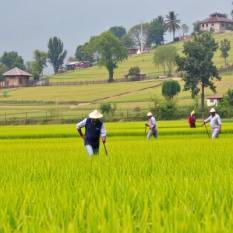PASIGHAT, 26 June 2025: In a significant move to bolster food security and adapt to changing weather patterns, the Krishi Vigyan Kendra (KVK) of East Siang successfully hosted a one-day ‘Kharif Krishak Sammelan’ at Silluk village on June 25, 2025.
The event, held under the National Innovations in Climate Resilient Agriculture (NICRA) initiative, focused on equipping local farmers with the knowledge and tools for climate-smart agriculture.
A key highlight of the Sammelan was the introduction of dragon fruit (pink flesh variety) as a high-value, climate-resilient crop for the region. Farmers enthusiastically participated in a hands-on demonstration, planting dragon fruit cuttings and marking a new chapter in the diversification of local agriculture.
The event drew a crowd of 65 farmers and was attended by esteemed dignitaries, including Dr. S.N. Puri, former Vice Chancellor of the Central Agricultural University (I), and the Deans of the College of Horticulture and Forestry (CHF) and College of Agriculture (COA), Pasighat.
In his address, Dr. S.N. Puri underscored the critical need for climate-resilient farming practices. "Dragon fruit is a promising, high-value crop that is well-suited to our region's agro-climatic conditions," he stated, urging farmers to maintain a strong connection with KVK to leverage scientific innovations in agriculture.
The Sammelan provided a robust platform for knowledge sharing through technical sessions conducted by experts from CHF and COA. Key topics included innovative strategies for citrus rejuvenation, managing dieback disease, best practices for oil palm and millet cultivation, and plant protection measures for crucial kharif crops.
The tangible impact of such outreach was evident in a success story shared by a member of a local Self Help Group (SHG). She credited the guidance from KVK and academic institutions for enabling villagers to successfully venture into poultry farming, polyhouse vegetable cultivation, and mushroom production, leading to enhanced income and nutritional security.
To further promote crop diversity and nutrition, the KVK distributed seeds of finger millet (variety MR-6) and foxtail millet (GPUF-3) to the participating farmers. The active participation and engagement throughout the day highlighted the farming community's commitment to adopting innovative and sustainable practices in the face of climate change.




















